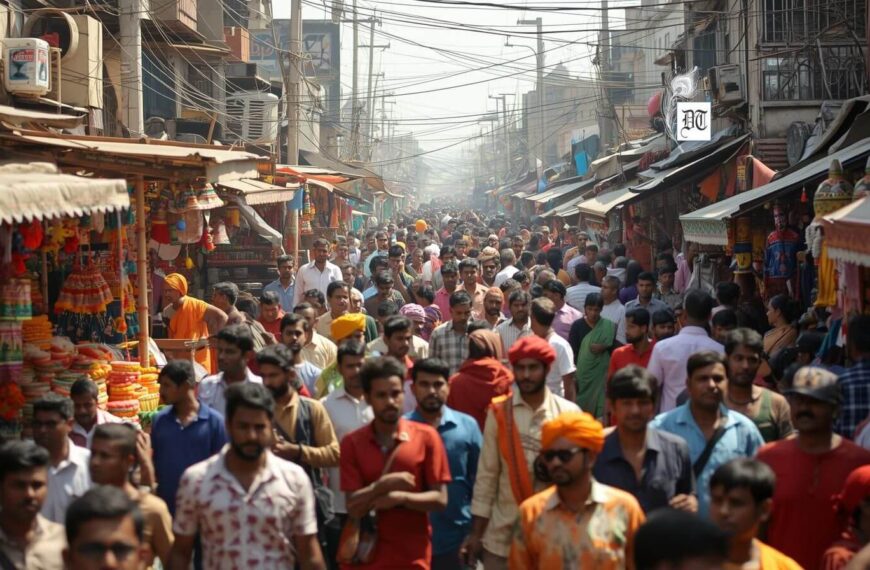Ruchira takes us through the enchanting world of Bauls, the roving mendicants, whose music are both mundane and divine. An exclusive for Different Truths.
 In early November this year, the national capital’s music aficionados, as well as Bengali Diaspora were witness to an unprecedented cultural event, the first ever Baul Fakir Mela. Staged on the verdant lawns of the Akademi complex, Mandi House, (bang in the heart of the metropolis), the two-day-long festival proved to be a major crowd-puller, attracting music lovers from nearby areas.
In early November this year, the national capital’s music aficionados, as well as Bengali Diaspora were witness to an unprecedented cultural event, the first ever Baul Fakir Mela. Staged on the verdant lawns of the Akademi complex, Mandi House, (bang in the heart of the metropolis), the two-day-long festival proved to be a major crowd-puller, attracting music lovers from nearby areas.
And these wandering minstrels (of both sexes) came from far and wide: from all across West Bengal. Some came all the way from Bangladesh (aka Opar Bangla), the barbed wire fence (bifurcating the territory) notwithstanding. It was the soul stirring yet passionate music that brought them together.
Baul Sangeet is a unique, distinctive genre of music, spontaneously appealing to all humans…. They revolve around crass realities, which form an inseparable part of our daily existence. Yet look beneath the façade and you will discover they possess a surreal as well as subliminal touch that hit the listeners hard.
Indeed, Baul Sangeet is a unique, distinctive genre of music, spontaneously 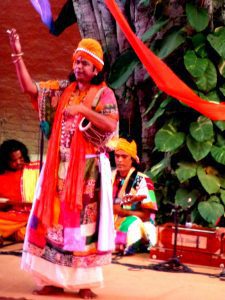 appealing to all humans: rich or poor, young or old, lettered or unschooled. The lyrics are humanistic both in tone and content. The dialect is earthy, motifs rustic, often bordering on the crude; the themes are mundane, devoid of polish or sophistication. They revolve around crass realities, which form an inseparable part of our daily existence. Yet look beneath the façade and you will discover they possess a surreal as well as subliminal touch that hit the listeners hard.
appealing to all humans: rich or poor, young or old, lettered or unschooled. The lyrics are humanistic both in tone and content. The dialect is earthy, motifs rustic, often bordering on the crude; the themes are mundane, devoid of polish or sophistication. They revolve around crass realities, which form an inseparable part of our daily existence. Yet look beneath the façade and you will discover they possess a surreal as well as subliminal touch that hit the listeners hard.
There are metaphors galore in Baul music. What appears before our eyes is superficial. The truth lies concealed deep within. For instance, most songs depict a baul forever searching for his/her Moner Manush (soul mate/beloved/companion). This elusive companion may either be a mortal human or a divine being (God, the Creator). This lifelong yearning for a union with the beloved, may or may not find fruition in this earthly life. However, not to worry, the lover and the beloved constantly aspire to achieve a blissful union in another realm which lies yonder…
Terms like khyepa/pagol (quirky, crazy, weird, madcap) occur prolifically in most Baul songs. Such individuals are not “mad” in the physical or medical of the term; the emotions accumulated in their hearts are frenzied, tumultuous, directed towards a rapturous union with the Supreme Being.
Terms like khyepa/pagol (quirky, crazy, weird, madcap) occur prolifically in most Baul songs. Such individuals are not “mad” in the physical or medical of the term; the emotions accumulated in their hearts are frenzied, tumultuous, directed towards a rapturous union with the Supreme Being. As their existence in this material world (so the bauls believe) is transient they attempt to live life on their own terms: singing and dancing with gay abandon, as and when their fancy permits.
How many of you are aware that etymologically, the term baul is derived from the Sanskrit word vatul meaning someone displaying an unconventional, idiosyncratic attitude towards life and society?
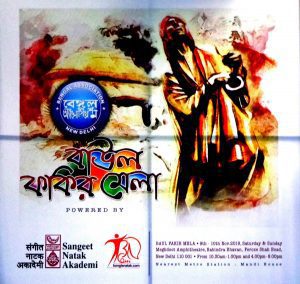
The basic concepts latent in Baul philosophy and music are dehatattwa (physical bonding) comprising the entire gamut of human emotions. Atmatattwa focuses on soul, knowledge, and spirit.
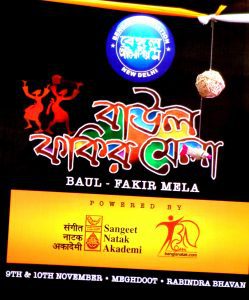 The basic concepts latent in Baul philosophy and music are dehatattwa (physical bonding) comprising the entire gamut of human emotions. Atmatattwa focuses on soul, knowledge, and spirit. Realising oneself is realising God. Gurutattwa undersc0res the importance of gurus/ mentors in the lives of bauls. An individual, in order to become a full-fledged baul must be formally initiated by a guru or murid. Once initiated, the novice has to totally surrender to his mentor. This is the reason why bauls to attach the suffix Das (servant/follower) to their names as a token of utmost commitment and devotion.
The basic concepts latent in Baul philosophy and music are dehatattwa (physical bonding) comprising the entire gamut of human emotions. Atmatattwa focuses on soul, knowledge, and spirit. Realising oneself is realising God. Gurutattwa undersc0res the importance of gurus/ mentors in the lives of bauls. An individual, in order to become a full-fledged baul must be formally initiated by a guru or murid. Once initiated, the novice has to totally surrender to his mentor. This is the reason why bauls to attach the suffix Das (servant/follower) to their names as a token of utmost commitment and devotion.
Back to the present. The Baul Fakir Mela, a joint collaboration of Delhi’s Bengal Association, the Sangeet Natak Akademi and Ministry of Culture, Govt. of India, was an audio-visual extravaganza. One felt virtually transported to the verdant countryside of Bengal. The motley bauls – clad in patchwork shirt, white dhoti ensembles, quaint headgear, topped by unruly, unkempt hair-beard-moustache – were delightful to watch.
One after another, the bauls glided smoothly, gracefully across the stage, twanging on the solo-stringed ektara, churning out soulful lyrics in raucous voices.
One after another, the bauls glided smoothly, gracefully across the stage, twanging on the solo-stringed ektara, churning out soulful lyrics in raucous voices. Their singing, interspersed with rhythmic foot tapping, and tiny leaps in the air was mesmerising.
For the spectators, the musical event will remain etched in their minds for a long time to come.
Photos by Malay Ghosh

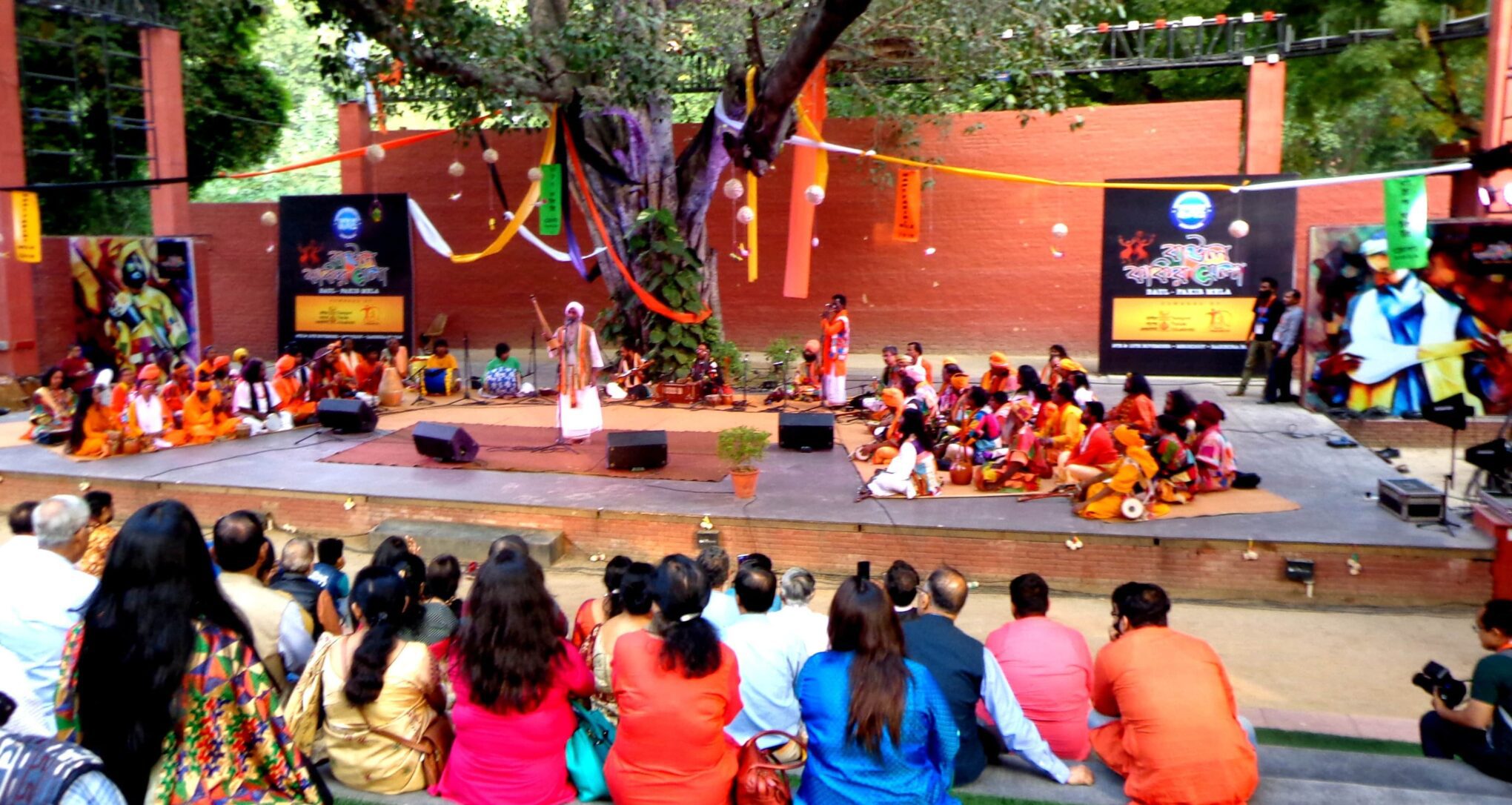



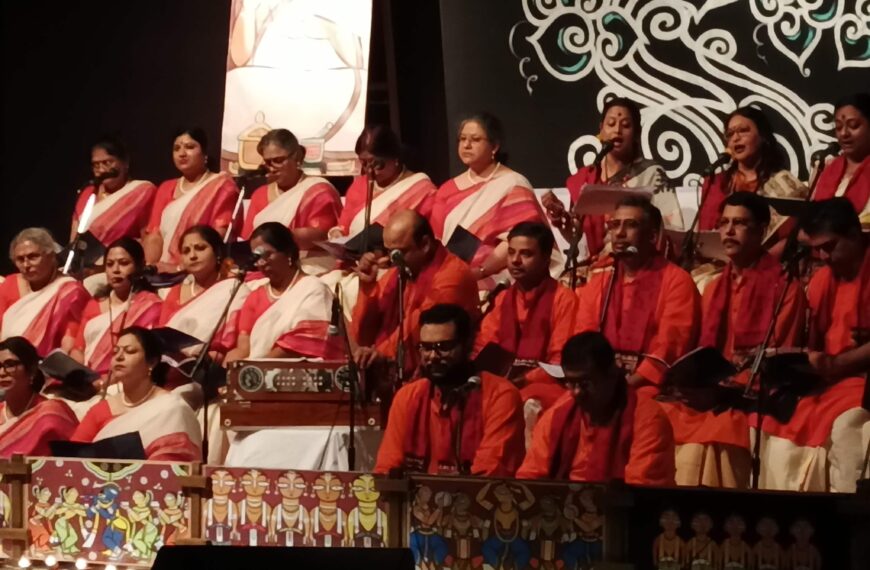
 By
By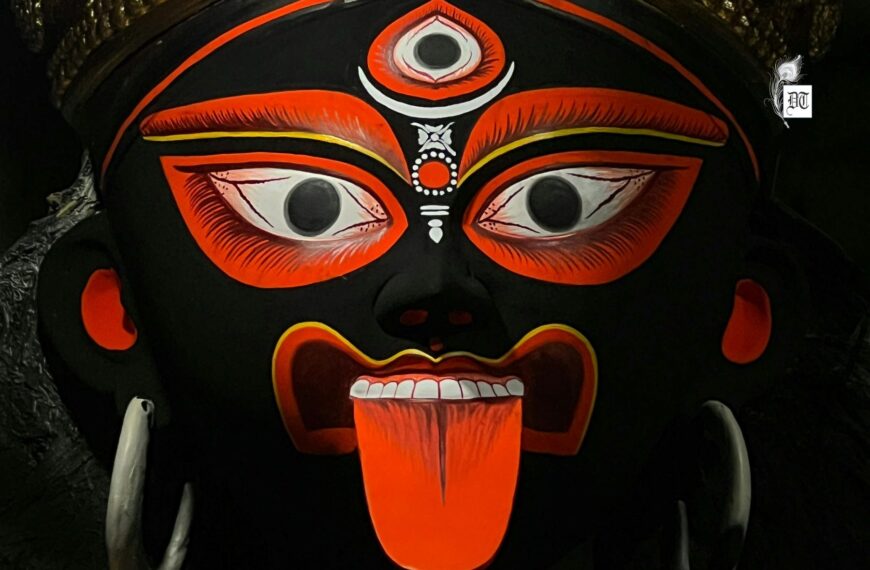
 By
By
